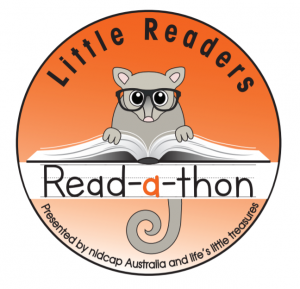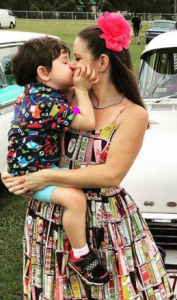Building small humans into healthy, thriving big ones, isn’t about clearing adversity out of their way. Resilience is being able to bounce back from stress, challenge, tragedy, trauma, or adversity. When children are resilient, they’re braver, more curious and adaptable, and more able to extend their reach into the world. Research tells us that it’s not rugged self-reliance, determination, or inner strength that leads kids through adversity, but the reliable presence of at least one supportive relationship. In the context of a loving relationship with a caring adult, children have the opportunity to develop vital coping skills. Just reading with your child for 10 minutes a day from a book they like which touches on subjects like diversity and problem solving, can increase their resilience, help them manage their own behaviour and feelings, and increase their capacity to develop their own coping strategies during tough times.

Michelle Worthington is an award-winning children's author and international guest speaker on the power of storytelling. Michelle is dedicated to encouraging a strong love of reading and writing in young children and supports the vision of empowering youth through education and working on books that are purposeful, innovative and inspirational.
Monday, 7 June 2021
Reading to Kids Makes Them More Resilient.
Building small humans into healthy, thriving big ones, isn’t about clearing adversity out of their way. Resilience is being able to bounce back from stress, challenge, tragedy, trauma, or adversity. When children are resilient, they’re braver, more curious and adaptable, and more able to extend their reach into the world. Research tells us that it’s not rugged self-reliance, determination, or inner strength that leads kids through adversity, but the reliable presence of at least one supportive relationship. In the context of a loving relationship with a caring adult, children have the opportunity to develop vital coping skills. Just reading with your child for 10 minutes a day from a book they like which touches on subjects like diversity and problem solving, can increase their resilience, help them manage their own behaviour and feelings, and increase their capacity to develop their own coping strategies during tough times.
Wednesday, 24 March 2021
Do books need a rating?
Would book censorship stifle the enjoyment and adventure of reading? In the forever metamorphosing environment of book genres, where young adult novels cover every conceivable topic that adult novels do, it makes sense to categorise books to suit reader age, and emotional intellect. But should written content be treated in the same way as visual content, like a movie? As parents, we have a responsibility to monitor what our kids read. A proactive approach to shared regulating what they read allows for open discussion around story topics, values and emotions; something every parent should be fostering. Children grow up so fast. Not permitting them access to a meaty young adult novel at age 12, even though they’re more than capable of reading it, may mean they remain 12 for just a little longer. Most school librarians are successfully implementing their own rating systems. Is it time to implement something nationwide?
Thursday, 18 February 2021
Opening Kids Hearts and Minds with Diversity in Picture Books
The best thing about books is that they can take you anywhere. Books offer us a perspective and experience that we may otherwise never know, and that glimpse into someone else’s story can be integral in creating open and accepting minds and hearts. Children’s books are no exception. Not only are diverse children’s books important for children of colour and with special needs - giving them visibility, relatability, and vital moments of representation - they’re important for all children. In a country as multicultural as ours, it’s vital to offer children an opportunity to see realities and experiences different from their own. Reading books with your children that celebrate diversity will help your children recognise that what is seen as outwardly different can just be a slight variation in the broad spectrum of humanity - and that different is not bad, but beautiful.
Thursday, 4 February 2021
Why talking to your kids will make them better readers
Vocabulary is extremely important to a child's literacy development, especially if they struggle to communicate. Having a broader range and understanding of what words mean and do can help even the most reluctant reader. Most people make the mistake of thinking that reading to kids and getting them to read aloud is the first place to start, but this is in fact the end goal. It starts with having a conversation with them on a daily basis.
When children see the purpose and priority behind where words fit in their day-to-day lives, they are more responsive to engaging with literacy activities that will foster a love of reading.
Friday, 23 October 2020
Reading to premature babies for brain development
Reading to premature babies every day supports development, not only in a Neonatal Intensive Care Unit (NICU), but also going into early infancy and childhood. Babies enjoy hearing their parent’s voice over any other sound, but what’s more important is that it’s an activity that parents can do every day for their baby during a time where many can feel helpless in an intense and stressful environment. International children’s book author, Michelle Worthington, is mother to three premature babies and knows what it’s like to go through NICU not being able to touch or take home your baby. Sometimes premmie baby may be sleepy or lethargic due to medications or illness. If the baby is awake and making eye contact with you, that’s the best time to read to them. Reading is also linked to improved language and writing abilities at school age, so it’s never too early to start.
Support Life's Little Treasures Foundation
https://lifeslittletreasures.org.au/
Tuesday, 20 October 2020
Why kids need authors as much as they need sporting stars
Our role models play an important role in shaping our dreams and ambitions. For many kids, the under-representation of the arts as a viable employment pathway, together with a lack of exposure to creative business owners from across diverse fields, makes it difficult for children who aren’t into sport to see themselves reflected in the people living their dream. Author and illustrator visits to schools play a large part in inspiring young children to not only believe in themselves, but to dare to expand their possibilities and take forward action on what they dream of doing. Until people in power respect the contributions and invest in the arts, the non-sporty kids will continue to miss out on finding their own heroes.
Book Week is 17 -23 October
Thursday, 1 October 2020
Is imagination an endangered species?
Modern children are very good at mimicry and mirroring instruction, but with the current curriculum’s focus on learning outcomes more so than learning pathways, are they losing the ability to think independently and inventively? The important role that imagination plays in creating engagement is being lost and forced literacy ignores the essence of critical and creative thinking: the need for questioning, exploration, and extended discussion around issues that are important to children. Without imagination, are our children equipped to be the leaders of tomorrow?
Thursday, 24 September 2020
Putting the 'home' into home reading
With lockdowns and restrictions continuing across the country, it can feel as if we’ve had enough 'family time'. But are we actually spending quality time with our children or just going through the motions of home learning? When we sit to share a book, we’re creating a space to be together, to be available for our child and not distracted by anything else that's going on around us. The agreement to share a book allows us to tune in to what really catches their attention, their emotions, their sense of humour, even what they don't particularly respond to. We can, through the book sharing experience, get to know our children better. Taking only five minutes a day to share a book with your child can go a long way towards facilitating and nurturing your relationship and improving their mental health, as well as your own.
Wednesday, 9 September 2020
Kids, change, and the power of picture books
Kids, change, and the power of picture books
Picture Books can be great tools for you to use to help your child understand change and new or frightening events, and also the strong emotions that can go along with them. When children are able to think about the text and make connections between the new information presented in the story and their store of background experiences, it allows them to be active and thoughtful about their own anxiety. Children can use picture books to make connections between familiar knowledge and incoming information in order to make predictions and inferences about characters, their motives and actions, as well as story events in order to learn that change is a natural and normal part of life.
Tuesday, 18 August 2020
Reading is Reading, No Matter the Medium
Reading is reading, no matter the medium
Waging a war to get your child to read can never be won; the only true victory happens when you lay down your arms and befriend the fact that for some children, reading is like having to eat their vegetables...they only do it because a parent says it’s good for them or a teacher makes them do it before they can move on to something 'fun'. The more we treat reading like a chore or homework, the more children are going to become disengaged from the true purpose of books; to give the gift of another world, a new friend or a mirror to celebrate what makes us all truly unique. Fun online reading games, reading apps and read along with animations on YouTube videos all have their place in modern literacy. Books have always come in all shapes and sizes, so reading is reading, no matter the medium.
Friday, 17 July 2020
Reconnecting with books embraces the old and the new
Thursday, 19 September 2019
Mind Kind Your Child's Mental Health with Dr Joanna North
Tell us about yourself, Joanna.
What inspired you?
What has been your journey up to this point?
What is the most important thing about what you do?
What are the challenges you face?
I love writing and I love my work with my clients. I have to manage my time really well. My diary is the main challenge of my life.
What advice can you offer to parents?
What is your definition of successful parenting?
Being mindful that every minute counts and that you are the source of learning for your child. Taking care of yourself so that your child absorbs mindfulness and calm from you.
What is your ultimate goal?
Tuesday, 9 July 2019
Why Reading to Our Littlest Babies Matters
Even the tiniest babies need frequent exposure to spoken language to ensure optimal early brain development.

Little Readers read-a-thon

Even the tiniest babies need frequent exposure to spoken language to ensure optimal early brain development.
Our Read-a-thon Ambassador

She’s also a real-life book fairy. Her magic powers include turning coffee into award-winning books. As Founder of Share Your Story Australia, she waves her wand to coach aspiring authors and illustrators all over the world achieve their dreams of publication. Whether she’s a fairy, a mermaid, a pirate or an elf, Michelle celebrates empowering readers and storytellers to dream big.

















